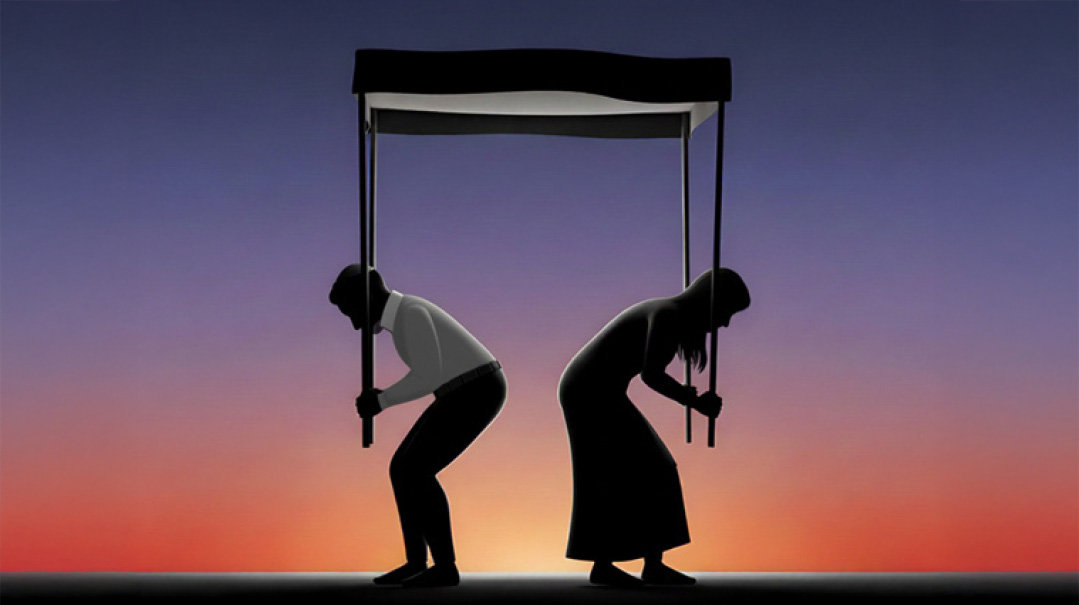In Search of Boundaries

“Ihad a dream last night,” our production manager once told me during our pre-Pesach crunch season. “Actually it was a nightmare. I dreamed that the magazine grids were empty, and I kept typing in the names of the articles, but they kept disappearing.”
Lots of us have experienced different iterations of her dream. This is the kind of job that defies easy boundaries. It creeps up on you wherever you are, wherever you go, invading your family time and social interactions.
Sometimes that works in our favor. I’ve found leads for stories while chatting at a wedding or taking my kids on Chol Hamoed trips (hint: the latter usually involve animals). Walking along a quiet street or waking up in the middle of the night, I’ll suddenly uncover a wisp of an idea for a clever coverline and then repeat it to myself over and over so it won’t disappear. New books will offer themes that eventually blossom into a feature. Relatives will punctuate casual schmoozes with the refrain, “Hey, that’s a good idea for the magazine!”
It’s nice to see the seemingly disconnected pieces of life link themselves together as those random encounters find their way into Mishpacha. But sometimes the thing I want most — firm boundaries between work and home — seems frustratingly elusive.
No one likes to hear a siren, but in this business, your ears prick with a special dread when a phalanx of ambulances passes by. The same is true for the loudspeakers that circle the neighborhood announcing levayos. You look and listen with a distinct editorial filter, digesting every new development through the lens of how does this impact the magazine.
At a certain point you start to wonder what kind of callous person you’ve become as you process, along with bad news, the inevitable questions: Do we have to cover this, how much time do we have to pull it together, how many pages should we reserve, who can find photos. You don’t want to jump into action before taking the time and brain space to feel what happened on a visceral gut level. But there isn’t always time, and a brain that’s wired to meet a deadline can’t always shift gears to high emotion.
After the horrific schoolyard shooting in Toulouse in 2012, I remember scrambling to pull together news coverage on a closing day within just a few hours. There was so much to do — adjust our grids to accommodate the new story, edit the text, locate the photos, verify the facts. At a certain point I closed the door to my office and stopped. That magazine deadline had become so important, so consuming, that we had almost become robots — typing and clicking and Skyping and ticking. I needed a few minutes to focus on the photo of eight-year-old Miriam Monsonego, the little girl whose blonde ponytail had been seized by the gunman so he could better aim his gun to kill her. Then I was able to focus on the grids again.
In an age where print media is atrophying and dying, Shabbos saves this magazine, from a business perspective. Our readers, unlike millions of secular readers across the world, need a print magazine. And in an age where work hours extend throughout the day and night, where the looping newsreel of current events seems to dictate our priorities, Shabbos also saves those of us who work to create this magazine. It’s that single day of the week when we take shelter in a solid barrier between the constant flow of potential material and the process that turns it into black words on white paper.
To be honest, it took me some time to learn how to disconnect on Shabbos, and there are weeks when it’s still a struggle. There are still interesting people to meet, fascinating stories to discuss, colorful sights to dissect — all of which might feed that endless hunger for new ideas. But there’s also a certain peace in knowing that no matter how good the idea, no matter how interesting the guest, there is absolutely no concrete step we can take to bring that potential to print. We are officially off duty.
Come Motzaei Shabbos, the news will go back on, the sirens will wail and the loudspeakers make their rounds, and we’ll get back to work. But for one blessed day, boundaries firmer and bigger than any mortal walls will allow us to experience life without any editorial filter.
(Originally featured in Mishpacha, Issue 754)
Oops! We could not locate your form.







